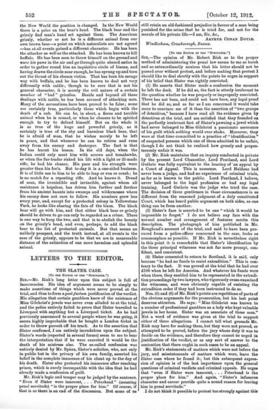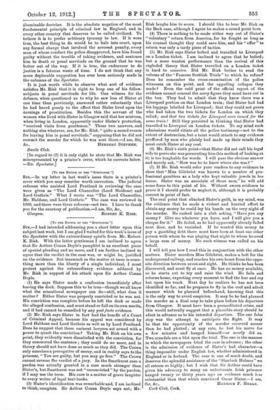[TO THE EDITOR Or THE "SPECTATOR.")
SIR,—The opinion of Mr. Robert Risk as to the proper method of administering the penal law seems to me so harsh and so extraordinarily noxious that his letter should not be passed over without protest, and before making that protest I should like to deal shortly with the points he urges in support of his belief that Slater was rightly convicted.
(1) He asserts that Slater made a confession the moment he left the dock. If he did so, the fact is utterly irrelevant to the question whether he was properly or improperly convicted. There has not been, and could not have been, any legal proof that he did so, and as far as I am concerned it would take more to convince me of it than the assertion of "two groups of detectives," because I have read all the evidence given by detectives at the trial, and am satisfied that they founded on the perfectly irrelevant fact of Slater's pawning a jewel which had never belonged to Miss Gilchrist a passionate assurance of his guilt which nothing would ever shake. Moreover, they were at that time committed to a practice of "identification" of suspected persons which one of them admitted to be unfair, though I do not think he realized how grossly and prepos- terously unfair it was.
(2) Mr. Risk maintains that an inquiry conducted in private by the present Lord Chancellor, Lord Pentland, and Lord Guthrie was fully equivalent to the hearing of 'an appeal by a Court of Appeal. This is nonsense. Lord Haldane had never been a judge, and had no experience of criminal trials, as far as is known to the public. Lord Pentland, I believe, never belonged to the legal profession or had any legal training. Lord Guthrie was the judge who tried the case. The decision of three gentlemen in these circumstances is as different from the reasoned judgment of a duly constituted Court, which has heard public argument on both sides, as one thing can be from another.
(3) Slater's face is asserted to be one " which it would be impossible to forget." I do not believe any face with the normal number and arrangement of features merits this description. The photograph of him published in Mr. Roughead's account of the trial, and said to have been pro- cured from a police-officer concerned in the case, looks as commonplace as possible. If Mr. Risk is nevertheless right in this point it is remarkable that Slater's identification by the three principal witnesses was not far more prompt, con- fident, and consistent.
(4) Slater consented to return to Scotland, it is said, only because "he had no funds to resist extradition." This is con- trary to the fact. It was proved at the trial that he had over £100 when he left for America. And whatever his funds were when there, they enabled him to be represented in the extradi- tion proceedings by two lawyers, who vigorously cross-examined the witnesses, and were obviously capable of resisting the extradition order if they had been instructed to do so.
Nos. (5) and (6) of Mr. Risk's points are repetitions of parts of the obvious arguments for the prosecution, but his last point deserves attention. He says: " Miss Gilchrist was known to a number of professional gamblers as a lady who kept valuable jewels in her house. Slater was an associate of these men." Not a word of evidence was given at the trial to support either of these allegations. I cannot tell what grounds Mr. Risk may have for making them, but they were not proved, or attempted to be proved, before the jury whose duty it was to decide on the evidence, and therefore they cannot be urged in justification of the verdict, or as any sort of answer to the contention that there ought in such cases to be an appeal.
Mr. Risk's statements of matters which were not before the jury, and misstatements of matters which were, leave the Slater case where he found it; but this subsequent expres- sion of opinion is of the last importance upon the general questions of criminal verdicts and criminal appeals. He urges that " even if Slater were innocent, . . . Peterhead is the proper place for him." And again, " Slater's infamous character and career provide quite a sound reason for leaving him in penal servitude."
I do not think it possible to protest too strongly against this
abominable doctrine. It is the absolute negation of the most fundamental principle of criminal law in England, and in every other country that deserves to be called civilized. To believe it is to prefer arbitrary tyranny to law. If it were true, the best thing to do would be to hale into court, upon any formal charge that involved the severest penalty, every man of whose conduct the police disapproved, have him found guilty without the trouble of taking evidence, and sentence him to death or 'penal servitude on the ground that he was better out of the way. If it is true, the endeavour to do justice is a fatuous waste of time. I do not think that any more deplorable suggestion has ever been seriously made in the columns of the Spectator.
' It is just worth while to observe what sort of evidence Satisfies Mr. Risk that it is right to keep one of his fellow- subjects in penal servitude for life. One witness for the defence, when questioned as to why he saw less of Slater at one time than previously, answered rather reluctantly that he had heard gossip to the effect that Slater lived upon the earnings of prostitution. Besides this the servant of the woman who lived with Slater in Glasgow said that her mistress, when living in London, apparently under Slater's protection, "received visits from gentlemen." These two answers, and nothing else whatever, are, for Mr. Risk, " quite a sound reason for leaving him in penal servitude," supposing that be did not commit the murder for which he was sent there.—I am, Sir, Barite Club.
HERBERT STEPHEN.
[In regard to (2) it is only right to state that Mr. Risk was Misrepresented by a printer's error, which he corrects below. —En. Spectator.]











































 Previous page
Previous page